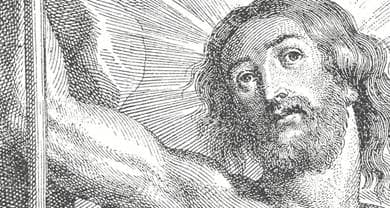- Trending:
- Pope Leo Xiv
- |
- Israel
- |
- Trump
- |
- Social Justice
- |
- Peace
- |
- Love

RELIGION LIBRARY
Anglican/Episcopalian
Modern Age
The modern age in Anglicanism has been marked by three particularly important movements. They are the charismatic movement, the ecumenical movement, and liberalism. Of these, liberalism has proven the most defining for the Anglican Communion, in terms of both its widespread acceptance and impact, and the potency of the reactions against it.
The Anglican manifestation of liberalism is the progeny of earlier Anglican Latitudinarianism and 19th-century continental liberal Protestantism. Latitudinarianism tended to emphasize reason and morality over theology. The core liberal emphasis was on examining the Bible historically and critically, rather than canonically as scripture. This resulted in a vacuum of both ethical and theological authority, for if the Bible is subject to criticism, its teachings need not be taken as normative. Evolutionary theory, alternative theologies, and fluid cultural norms began to fill the vacuum. The outcome has been a radical (or revolutionary, depending on one's perspective) re-formulation of fundamental doctrines of Christianity. Although the changes have numerous, complex, and not always consistent with one another, it may be said in summary that Liberal Anglicanism tends to question some or all of the following: the doctrine of creation (that God created and sustains all things and is distinct from creation), the fall as descriptive of human nature (that people are incapable of pleasing God on their own), the divinity of Christ, the doctrine of the atonement (Christ took on the punishment that humankind deserved and through this sacrifice reconciled humanity to God), and the continuing applicability of biblical moral injunctions. The positive content that has been raised up in place of these has varied.
These characteristics are not unique to the Anglican version of liberal Christianity, but the impact of liberalism has taken particular shape within Anglicanism. The ecclesiastical diversity already present within Anglicanism has become more complex. Latitudinarianism effectively transitioned into Liberalism. Some Anglo-Catholics, adhering to Tractarian ideas of Catholicity, reject liberalism outright while others, however, adopt its tenets. Charles Gore, editor of the 1889 collection of essays Lux Mundi, initiated the transition of part of the Anglo-Catholic school into the so-called Liberal Catholic school. He sought to adopt critical scholarly methods while holding fast to the doctrines set forth in the historic creeds of Christianity. Most adherents of Liberal Catholicism since Gore, however, adopt liberalism wholesale, folding it into their ceremonialism for a highly experiential expression of Anglicanism.
Evangelical Anglicanism, with its firmly doctrinal orientation, rejects the theological outcomes of liberalism almost by definition. Nevertheless, the last several decades have seen a movement of so-called "open" evangelicalism, which adopts (often in modified form) some of the critical methodologies of liberalism, holding (as Gore did) that the tenets of the faith will ultimately be sustained by proper inquiry. Many open evangelicals also adopt various ethical perspectives of liberalism, especially regarding the remarriage of divorced persons and the ordination of women to the priesthood, but in some cases also regarding the permissibility of homosexual practices.
The extreme diversity of modern Anglican belief has raised knotty questions over the nature of Anglicanism, some theorists promoting a unity that comprehends the diversity, with opposites being held in tension. Others have rejected this notion as unworkable.
Advocacy of the permissibility of homosexual practices, rooted in a commitment to the moral equivalency of hetero- and homosexual relationships, has become the center of a worldwide debate within Anglicanism. It has become widespread in North American Anglicanism, and also in Britain and some other provinces. The dioceses of New Hampshire (USA) and New Westminster (Canada) have promoted this stance decisively, the former consecrating the first openly gay bishop in the Anglican Communion in 2003, and the latter approving rites for same-sex unions. These have generally led to relief and celebration in liberal circles, disappointment and outrage in evangelical and traditional Anglo-Catholic circles. There has since been schism on a large scale in North American Anglicanism, with conservative groups splintering. Some of the larger groups include the Anglican Mission in the Americas (AMIA), the Convocation of Anglicans in North America (CANA), and four dioceses of the Episcopal Church (USA). There is a movement to unite these groups, along with smaller splinter groups and the Reformed Episcopal Church (which split off over a century ago) into one province in North America distinct from existing Anglican provinces.
The strife has by no means been restricted to North America. The worldwide Anglican Communion is being divided over the issue. In the global south, where the doctrinal, and in many ways ethical, impact of liberalism has been much more muted than in the West, numerous bishops and archbishops have condemned the American action, both for its ethical underpinnings and for its rejection of the procedures called for by the Lambeth resolutions. They see the Instruments of Communion of the Anglican Communion (which are the Archbishop of Canterbury, the Lambeth Conferences, the Anglican Consultative Council, and the Primates' Meetings) as having failed. Archbishop of Canterbury Rowan Williams, doubtless fearing a formal split in worldwide Anglicanism, has promoted a process for drafting an Anglican Communion Covenant that would set forth standards of faith and discipline. Views differ widely, however, on what the contents of the Covenant should be, and the effectiveness of the processes is not yet assured.
Meanwhile, a formal split seems to be afoot, and some claim it has already taken place. In June 2008, Jerusalem was host to the Global Anglican Future Conference, or GAFCON, representing nearly half of the roughly 80 million Anglicans worldwide. The Jerusalem Declaration announced there set forth a statement of faith that includes the authority of the historic creeds and the Thirty-nine Articles, and the nature of the Bible as the word of God. It also called for the formation of a fellowship of confessing Anglicans and a Primates' Council, the latter of which would have authority to recognize confessing jurisdictions. If the GAFCON movement is sustained, the likelihood of a universally recognized split seems very high indeed. As a practical matter, the notion of a unity comprehending such great diversity is probably already proven untenable.
Study Questions:
1. What three movements are important to Anglicanism in contemporary society?
2. What is Latitudinarianism? What was its theology, and outcome?
3. What doctrines does Liberal Anglicanism question?
4. What is Evangelical Anglicanism?
5. Why might an Anglican Communion Covenant be necessary in contemporary society?










